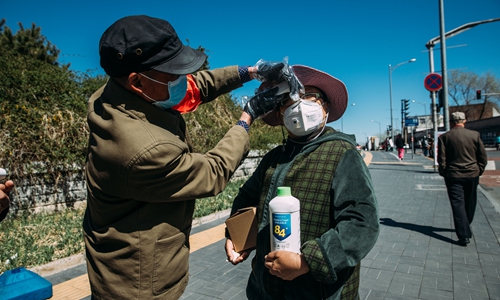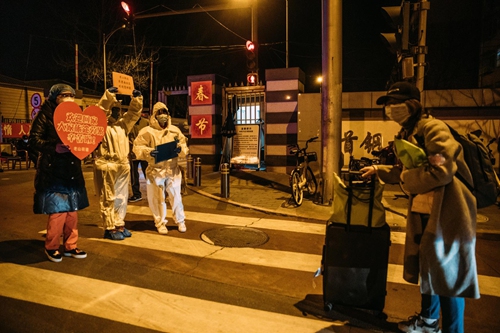HOME >> CHINA
Beijing ready to welcome more domestic returnees with comprehensive local efforts
By Wang Qi Source:Global Times Published: 2020/3/28 0:50:19 Last Updated: 2020/3/31 19:20:19

On Friday, community workers in Laoshan Community in West Beijing's Shijingshan district conduct a range of measures like disinfection, checking temperatures and setting up smart monitors to ensure residents' safety as China's capital faces increasing pressure of imported cases from abroad and returnees from other parts of China. (Photo: Li Hao/GT)
Facing the pressure of imported cases from overseas and domestic arrivals, the local community is managing all returnees in a strict and humane manner, as well as applying technologies to ensure smooth home isolation.
Global Times reporters visited a community and talked with a Hubei Province returnee who just experienced their first day of 14-day home isolation, following the lifting of outbound travel restrictions on cities excluding Wuhan in Hubei Province starting on Wednesday, that allowed people from the province to return to megacities like Beijing, where they usually live and work.
Xinhua News Agency reported there are still about 200,000 people stranded in Hubei Province waiting to return to Beijing, but it seems that China's capital is ready for it.
'Precaution is against virus, not people'
Lu Yuhang, the Hubei returnee returned on Wednesday from Xiangyang, together with 800 others who were stranded in Central China's Hubei after more than two months of lockdown in the COVID-19-stricken region.
Led by Zhu Tao, the vice director of the residents committee of Laoshan Community in west Beijing's Shijingshan district, reporters visited Lu Yuhang's home and talked with him in the stairway keeping a social distance of about 5 meters.
Lu told the Global Times that he is an IT worker who was not affected too much by the epidemic outbreak, as he can work online at home. He had worked remotely while he was stranded in Hubei. As he lives in the countryside in Hubei, Lu said there were not as many restrictions as in Beijing, and he could take walks in the fields.
Facing potential discrimination of coming from a hard-hit region, Lu shared his understanding but had few concerns.
"If I was someone who stayed in Beijing during the spread of the coronavirus, I would definitely worry about my neighbor coming back from Hubei, just like how people in China feel about those returning from abroad. So, I must strictly obey the rules of 14-day home isolation to make my neighbor less stressed.
"Precaution is against the virus, not people."
A self-proclaimed workaholic, Lu said he already knew how he'd kill the time during his isolation. "I returned to my home in Beijing at about 11:00pm on Wednesday, but I still worked until 1am."
After the quarantine is lifted, he said he wanted nothing more than a nice meal of hot pot. In addition, he said he will accompany his pregnant wife to the hospital for a prenatal checkup.
Lu also expressed gratitude to the community workers. Before returning to Beijing, he bought a lot of daily necessities online, such as disinfectant, toilet paper, milk and bottled water and community workers delivered them to his home.
"The stuff Lu bought could last for a week so he wouldn't have to bother community workers many times," Zhu said, noting the community is trying to meet the needs of all returnees.
"Lu always follows the directions on his packages," Zhu said, amusing everyone.

Community workers from Shijingshan district in Beijing pick up a batch of returnees stranded in hard-hit Hubei Province at Beijing West Railway Station and escort them home. Photo: Li Hao/GT
Stricter controls
Lu locked his door after we finished chatting and put paper seals on it, made with A4-sized paper, writing the time on it.
"It doesn't mean we don't trust him, it is just a requirement of ensuring strict supervision," said Zhu, who said that people under home isolation must report their temperature twice a day to community workers by sending pictures or videos on WeChat.
Currently, with at least 150 imported infections, Beijing has decided to apply strict home isolation, especially after the first domestic infection related to an imported patient's violation of home isolation occurred in mid-March.
Besides the paper seals and a signed legally binding agreement, Beijing, especially in Laoshan community, uses an intelligent doorbell with a monitoring function to ensure strict enforcement of home isolation.
Developed by Xiaomi, a palm-sized smart doorbell was installed on Lu's door by a community worker surnamed Liu.
Liu showed reporters how the doorbell works: As soon as the environment or status of the door changes, such as someone ringing the doorbell, the door opening, or someone walks past the door, an app called Mijia installed on the community worker's phone will send an alert and a 6-second real-time monitoring video.
According to Qianlong.com, some communities in Haidian district also applied this technology for monitoring home supervision.
"It (smart doorbell) was first donated by Xiaomi, and we bought some after we saw their usefulness," said Liu. "To ensure privacy, we will ask permission of returnees from other parts of China, but overseas arrivals are forced to install the devices."
Pressure of grass-roots level
Zhao Hong, the Party chief of Laoshan Community, told Global Times on Thursday that a total of 556 returnees had arrived in the community as of Wednesday, including 3 from overseas, and 2 from Hubei, and 11 more are expected to return from Hubei in the near future.
Zhao said her team comprised 12 cadres, with about 100 volunteers, mostly retired elderly people, who patrol to see if there are any gatherings, help register and check temperatures at the main gate.
She added that each of the 12 cadres is responsible for taking care of over 210 residents, a heavy workload in the nearly 1,900-household community. Their daily work includes supervision, standing guard and caring for quarantine workers.
"The hardest part of our work is finding a balance between permanent residents and returnees. We try to make neighbors feel comfortable and be understanding of the returnees, but also make the returnees feel welcome," she said, noting that there was one tenant in the community from Henan Province who refused to let her roommate home isolate. After repeated coordination, the roommate finally chose to quarantine in a designated hotel.
Apart from offering emotional support, Zhao said they also conduct public disinfection, especially in stairways and trash bins, at least three times a day. An extra two disinfections in the stairway of returnees' buildings are also required.
"Actually, most people are relieved as most returnees have proved safe and have not been infected."
Zhao told the Global Times that although most people who return to Beijing from other domestic regions home isolate, they also have to take care of others who don't meet the requirements of home isolation, such as a person who shares rent but doesn't have a separate room, or those who volunteer for a designated isolation so as not to affect family members.
"The three overseas arrivals in our community are all under public quarantine in three different designated hotels, including a student and a 70 something person. We talk with them every day to assess their health and mental status," said Zhao. "We deliver food to the elderly man every day and bought him a coat after he said he felt cold in the hotel."
"I advise people to get more sleep during isolation. Two extra hours of sleep a day means 28 hours in 14 days, which is equivalent to one less day in isolation," Zhu joked.
"It's getting warmer and warmer, our fight lasts from the season of wearing coats to wearing shirts, but it makes me proud to contribute to my country," said Zhu.
Feng Xiangqian from Hubei Huangshi was among the first group of returnees on Wednesday. He thanked his friends and community workers on social media on Friday. On the same day, his hometown Huangshi announced the zero-clearing of all COVID-19 cases.
"It was tough in the first days of home isolation. Friends, familiar and not so familiar, brought me all kinds of food and drinks and some of my colleagues wanted to send me disinfectants. There are so many people who want to give me a hand, I thank you all!
"After 64 days away from Beijing, I was most worried about the flowers and plants at home. I was even prepared for them to have withered, but these tenacious plants survived. Their desire for life is really incredible! Plants are able to overcome crisis, so can human beings!"
RELATED ARTICLES: